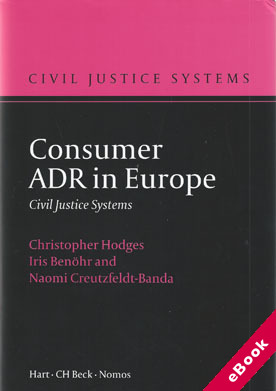
The device(s) you use to access the eBook content must be authorized with an Adobe ID before you download the product otherwise it will fail to register correctly.
For further information see https://www.wildy.com/ebook-formats
Once the order is confirmed an automated e-mail will be sent to you to allow you to download the eBook.
All eBooks are supplied firm sale and cannot be returned. If you believe there is a fault with your eBook then contact us on ebooks@wildy.com and we will help in resolving the issue. This does not affect your statutory rights.
This is the first systematic comparative study into how consumer ADR systems (usually ombudsmen and médiateurs) work, the differing national architectures within which they operate and how they can be improved.
It describes ADR schemes in France, Germany, Lithuania, the Netherlands, Poland, Slovenia, Spain, Sweden and the United Kingdom as well as emerging pan-EU dispute resolution schemes. Use of the techniques of mediation, conciliation and adjudication are noted.
It also covers EU measures on consumer ADR, and 2011 proposals for legislation on ADR and ODR. Data on volumes, cost and duration of ADR schemes are compared, both between different systems and with courts. The authors' findings underpin EU and national developments, and outline options for future policy. Findings and proposals are included for the functions, scope, performance, essential requirements, architecture and operation of ADR systems.
The relationships between ADR, courts and regulators are discussed, and need for reforms are noted. This is a ground-breaking work that will have a major impact on European legal systems.